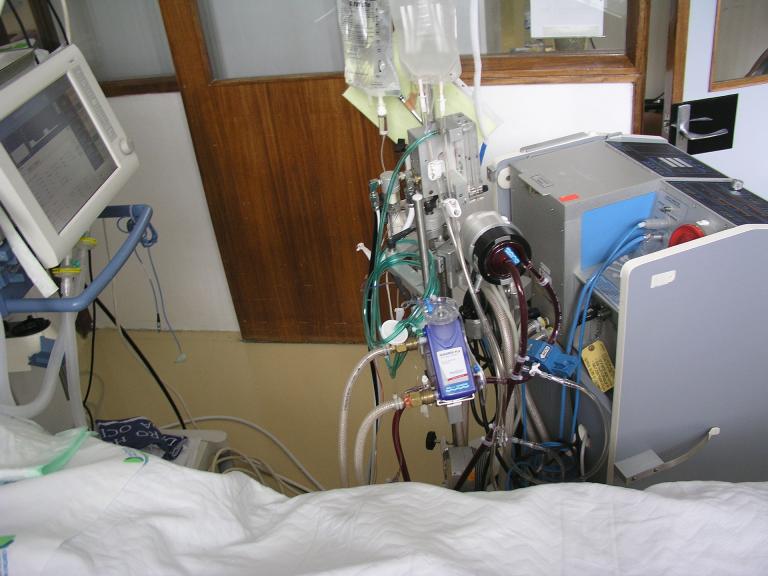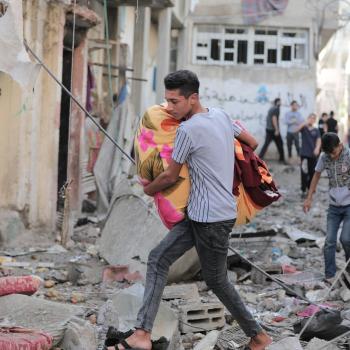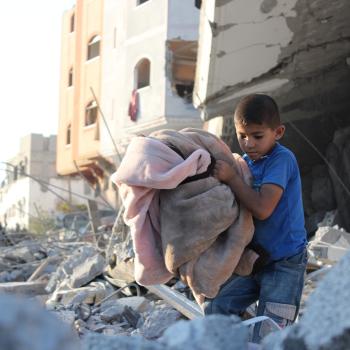My family was involved in a very difficult decision making process last week, when after days of going back and forth, we decided to remove life support from my youngest sister’s husband. This was probably the hardest decision making process I was ever a part of. I knew it would be tough, I just didn’t realize how much.
I have avoided sharing my personal or family life on my blog. I will make some references to the medical and religious aspects of having to remove life support from a family member but this ordeal has affected me hard enough that I was compelled to share my experience from a personal and human perspective. A close friend suggested I write about it- as a means of catharsis as well as drawing attention to a real-life situation that I pray no one will ever have to encounter.
I will refer to my sister’s husband as “AZ” out of respect for his and his family’s privacy. AZ was 47 when he passed away last week.
AZ was not known to have any prior serious medical problems. I received a call from my sister on January 5 that she was in ER at a university hospital in Texas because AZ was having difficulty breathing. The Cardiologist suspected heart issues and took him for a coronary angiogram right away. Within hours, I heard back that AZ had widespread and total coronary artery blockage. They had put two stents but the cardiac surgeon told them his arteries couldn’t be bypassed. His heart muscles were so weak that it was hardly pumping. His blood pressure was dropping and so was his oxygen level. He would not have made it out of the cath lab if they did not hook him up to the life sustaining machines.
He was put on an external heart lung machine, called ECMO. They also hooked him to the mechanical ventilator and a number of IV medications to support his heart pumping and BP.
We were still hopeful that this would be temporary and that his heart will improve spontaneously with time as he recovers from the massive heart attack.
As it turned out, it did not.
The hospital team was absolutely fantastic. They kept us up to date and did everything they could to help save AZ’s life. We had several family meetings with his doctors.
It was around day 10, that they told us that they were not optimistic at all that his heart will improve on his own. They tried to tell us he wouldn’t survive.
But we kept our hopes alive even though we realized he was in critical condition.
Instead of improving, his organs started to fail-one at a time. His kidney started first, requiring his doctors to start on continuous renal therapy (a form of around the clock slow dialysis). The doctors asked in a subtle manner if we would consider removing the life support given that they had practically no hope of him recovering, and to put a stop to his suffering. He had an episode of internal bleeding. But AZ was too sick to be moved out of the ICU room for any therapeutic intervention. The bleeding stopped spontaneously after a couple of days.
AZ survived- for the time being.
Several days later, the doctors informed us the cardiac function had not improved, and in fact may have gotten worse. They asked us more directly about making a decision regarding removing life support.
AZ did not have a living will or a durable power of attorney to guide his wife (my sister) or the family as to what his wishes were in this scenario. So my sister had to make a decision for him. She sought input from the family.
This is when the family seriously started this VERY difficult decision making process to consider withdrawing life support. We were also told he will not survive a few hours after removing the ECMO machine that was doing the heart pumping for him.
We consulted a local Imam to get a religious perspective on removing life support. During a family meeting with doctors, the local imam essentially told everyone it would be against the Islamic traditions to do so, citing religious edicts.
We decided to keep AZ on life support.
But AZ continued to deteriorate. His liver started to fail. Towards the last few days of his life on this earth, his blood got so thin as a result of the failing liver that he started to ooze blood from his nose and ears. His leg lost circulation and started to die.
He was suffering, even though he was in medication induced coma. This is when I decided to get a “second opinion” from another Imam I know and respect very much. He told me that under these dismal circumstances, removing the life support was allowed. He quoted his own father’s example. He also made references to the religious edicts from highly regarded scholars to support his viewpoint.
I informed my sister about this. We had another meeting with the doctors and they confirmed AZ had practically no chance of recovery.
This is when my sister made the most painful decision to remove ECMO-the life support machine, from AZ.
To make things more complicated, AZ’s mother and siblings did not want to remove life support- no matter what.
Many more meetings ensued over the next few days between the two families and the doctors. The hospital team was pretty unanimous and clear. They favored removing life support to ease the suffering and not prolong the inevitable.
My sister had to then make the most painful decision to proceed with removing the life support, as she could not see AZ suffer anymore, with no hope for spontaneous recovery from a medical standpoint.
In the days leading up to his final day, I kept praying to God (turned out the whole family was praying the same) to either give AZ health or take the decision out of our hands, if that was God’s will.
As it turned out, we had to make the decision.
My sister gave AZ’s physicians a specific time to remove the life support. The family members had flown in from out of town. We all gathered around AZ, praying and reciting Qur’an as his ICU physician, who was at the bedside, initiated the process of removing life support. The family started to recite the Qur’anic Surahs(chapters) and other supplications that are customarily recited for seriously sick or dying persons.
AZ passed away within minutes of starting the process- faster then we had anticipated. He spent 25 days in the ICU.
We were told “it would be quick” but this was quicker than quick, and rather jolting.
In the aftermath:
I knew it would be tough. But what I did not expect was my reaction to see him pass away within minutes as his cardiac monitor went from showing normal beats to a flat line, and his chest going from moving up and down (albeit caused by machines) to not moving at all. It was so quick that my sister was not even able to finish the Qur’anic Surah, when the doctor told her in the middle of her reciting that AZ had passed away.
The room got very quiet very quickly. My sister paused for a moment, stared at AZ with a dazed look, and proceeded to finish the recitation while holding his hand.
I have been in the field of Medicine for over 35 years. I have witnessed many deaths. I have been unsuccessful resuscitating my patients and had felt bad for my patients and their families. But this felt very different. Throughout my medical career, I was never a part of removing life support. To have that first experience, and that too for a family member has been tougher than I ever expected.
Watching my sister, AZ’s mother and sister cry made things even worse for me.
I started to second-guess myself almost as soon as AZ’s physician pronounced him. After all, it was my conversation with the second Imam that initiated this whole process. And being a physician myself, my opinion factored in the decision-making by my sister, who had the legal and religious right to make the decision.
In accordance with Islamic traditions, AZ was buried the next day in a local cemetery.
I had hard time sleeping the night he passed away and the night he was laid to rest. The second-guessing became even more intense. Some of the verses from the Qur’an were flashing in mind.
…if any one killed a person – unless it be for murder or for spreading mischief in the land – it would be as if he killed the entire mankind: and if any one saved a life, it would be as if he saved the life of the entire mankind….5:32
(A very similar passage is found in Talmud as well)
From a physician’s perspective, there is still no question in my mind that AZ would not have survived another week, if that. There were some lingering questions at the religious level. Did I contribute somehow to take the matter in our hands and hasten his demise?
I did some more research and found conflicting religious rulings as to whether ending life support is allowed in Islam. After two agonizing nights, I felt compelled to call the Imam again. He tried to reassure me that it was the right decision, and that it was in accordance with the Islamic teachings.
I shared my feelings with my wife. She reassured me that it was the right decision and that e had done our due diligence-thoroughly and it was done with the good intentions to to help ease AZ’s suffering.
It made me feel a little better from the guilt perspective. But at a personal level, the whole ordeal continued to bug me.
And watching his mother and sister, and my sister cry incessantly during AZ’s final religious services was very hard, pushing me into another round of second-guessing.
You see it would have been very tough even if he passed away “naturally”. But the circumstances made it even tougher.
Several questions kept crossing my mind. Did I contribute to his demise, even by a few days? Should we have let the “nature take its course”? Despite some reassurances from the Imam, I kept asking myself, “did I interfere with God’s will?”
I decided to share my feelings “publicly” at the prompting of a close friend. If nothing else, I hope it can start a healthy dialogue and some introspection about the end of life care and the religious rulings and morality around removing life support.
Do you have durable power of attorney for health care? Have you let your family know your wishes regarding end of life care, or removing life support? If you have, it will go a long way in ensuring your family will not have to go through the painful process of deciding it for you. And if it is your decision, they won’t have to be split on the decision making process. Have you consulted your religious leaders about the religious validity of your decision?
What are your viewpoints-personal and religious on removing life support?
Have you been through a similar situation where you were asked to decide about removing life support from a loved one? Was the whole family “in it”? How did you react when it happened? How did you comfort yourself? How did you reconcile the inevitable without any second-guessing?
This was especially difficult for us because this was sudden, he was young, there was no advance directive, the religious guidance was rather split and the family was also split.
I hope sharing my experience will also trigger conversations among families, and between religious leadership, local communities and physicians on issues around end-of- life care and removing life support.
I sure hope and pray to God that no one ever is put in a situation to make such decisions. Amen.













